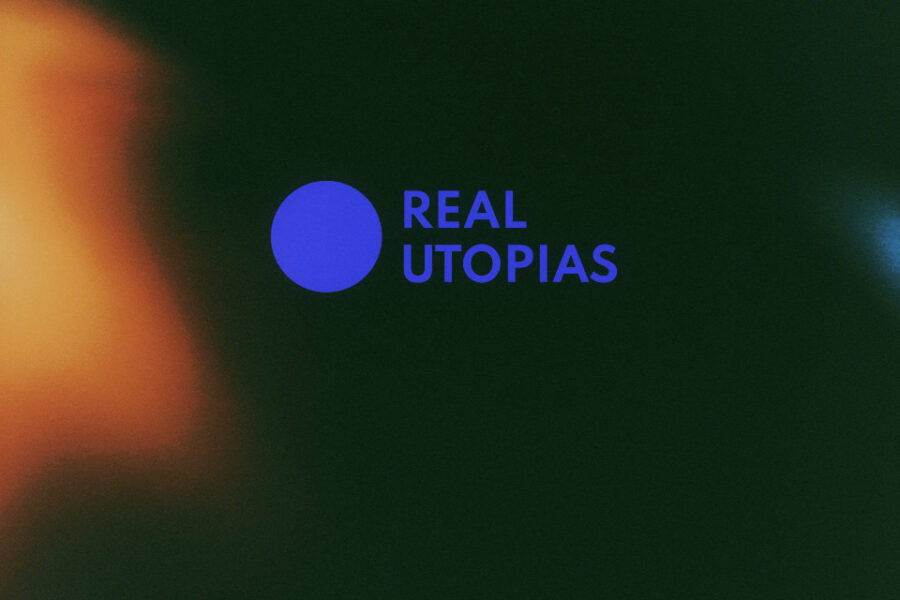
REAL
UTOPIAS
RESEARCH CONTEXT
‘Real Utopias’ is part of a larger research project (“Zur Zukunft”) exploring the impact of future visions on the present – on a cultural, political and on an individual level. How do our visions of the future affect the way we live, interact and the decisions we take? And how can we imagine, construct and create desirable, just, alternative futures? For the past three years I have conducted interviews with individuals from various social, cultural and political movements pushing for change and have visited and observed places, collectives that exist on the fault line between ‘dreams and practice’. In these spaces – ‘real utopias’ – one can witness how ideals can be put into practise by trying and experimenting. What can we learn from utopian experiments of the past and real utopias in the present? How and where have they failed, how and where have they succeeded? What was and is their impact on our present and future?
MOVING RESOURCES
With public debates on climate, gender or racial injustice often revolving around the very existence of these, a significant amount of resources of social justice movements is depleted by the burden of evidence. This research aims to widen the space for a discourse on alternative, desirable, just futures and the political and social power of imagination and dreaming. To create more resources moving from deconstruction the past and present into the construction of the future.
WHY ‘REAL UTOPIAS’?
The sociologist Erik Olin Wright argues that if ‘social and political justice [. . .] [are] to be our future, it will be brought about by the conscious action of people acting collectively to bring it about’. [1] Once we let go of the notion that ideals have to be realised everywhere at once, we will be free to open up spaces now where we can try out utopias ‘as best we can’, knowing full well that the experiment can only be partially successful. [2] Wright calls these spaces ‘real utopias’, and argues that we should divest ourselves of the illusion that we can create perfect institutions once and for all, and then rest for ever more. This is why these spaces are of utmost importance: We can not only catch a glimpse into an alternative reality and possible futures for us all, but also assess risks and opportunities.
A sneak peak into some of the insights of this research can be found here in an interview I did with Deutschlandfunk Kultur (German).
This research is enabled (and financed) by the Mercator Foundations Senior Fellowship that I have pursued at CRASSH and LCFI at Cambridge University (2022).
RESEARCH PROJECT
EXPLORING JUST FUTURES
“ZUR ZUKUNFT”
BY KÜBRA GÜMÜŞAY
MERCATOR SENIOR FELLOW
AT CAMBRIDGE UNIVERSITY
[1] Erik Olin Wright, Envisioning Real Utopias (London: Verso, 2010), p. 370. In his discussion of utopias, Wright argues that ‘Capitalism obstructs the realization of both social justice and political justice. This is the fundamental starting point in the search for alternatives: the critique of capitalism as a structure of power and inequality. [. . .] This does not imply that all social injustices are attributable to capitalism, nor does it imply that the complete elimination of capitalism is a necessary condition for significant advances in social and political justice. But it does imply that the struggle for human emancipation requires a struggle against capitalism, not simply a struggle within capitalism.’ Ibid., pp. 366–7.
[2] Foucault called such spaces ‘heterotopias’: ‘real places – places that do exist and that are formed in the very founding of society – which are something like counter-sites, a kind of effectively enacted utopia in which the real sites, all the other real sites that can be found within the culture, are simultaneously represented, contested, and inverted. Places of this kind are outside of all places, even though it may be possible to indicate their location in reality.’ Michel Foucault, ‘Of Other Spaces’, trans. Jay Miskowiec, Diacritics, Vol. 16, No. 1 (Spring 1986), 22–27.
FUNDED BY STIFTUNG MERCATOR

MERCATOR SENIOR FELLOW ’22 AT

